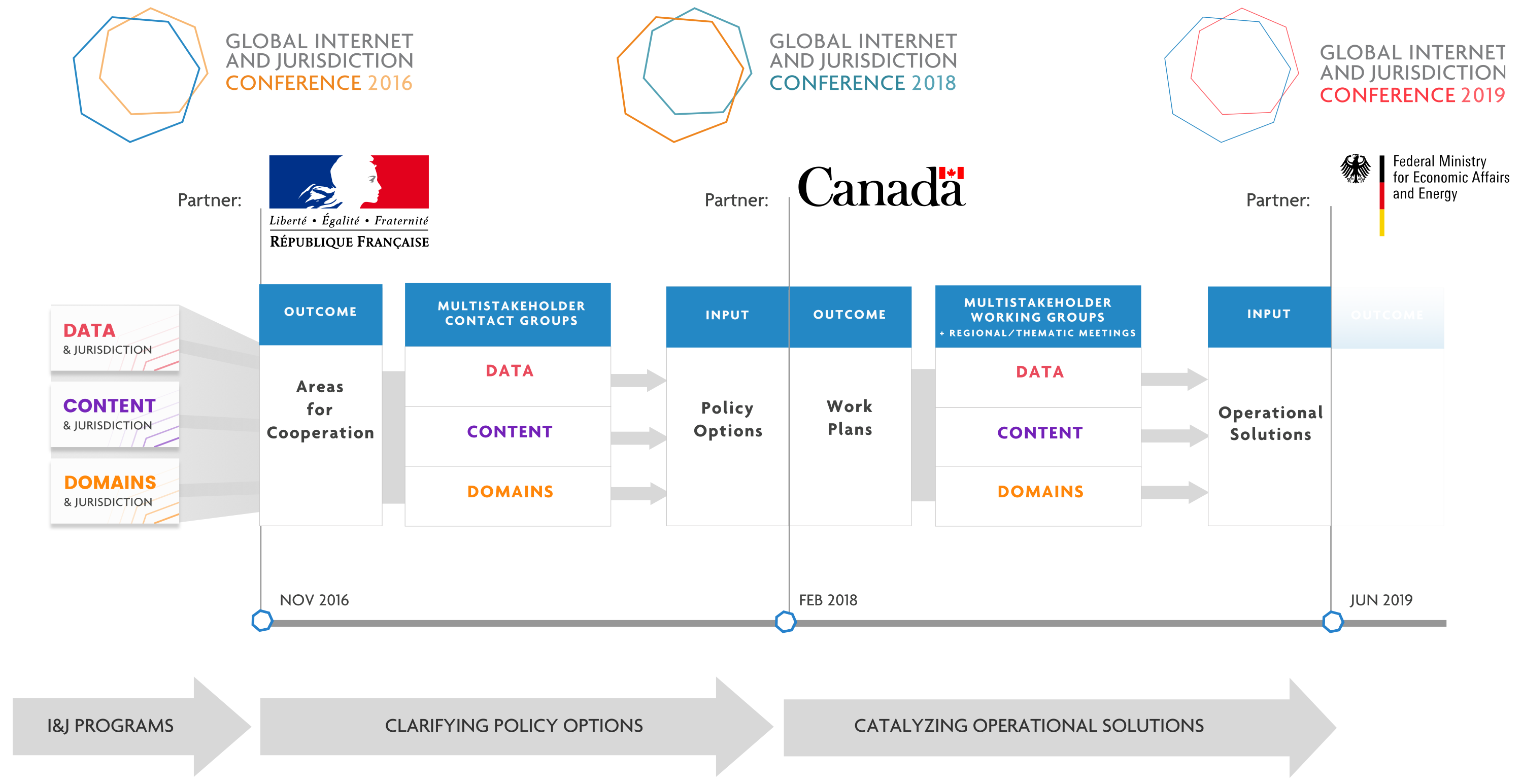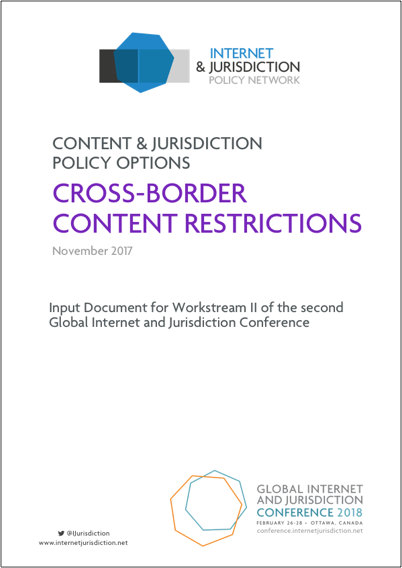The Secretariat of the Internet & Jurisdiction Policy Network is pleased to announce the release of the Policy Options Document for its Content & Jurisdiction Program. It will serve as official input to structure discussions in Workstream II on Day 2 of the second Global Internet and Jurisdiction Conference of the Policy Network on February 26-28, 2018 in Ottawa, Canada.
This Policy Options Document, prepared by the Secretariat of the Internet & Jurisdiction Policy Network, presents the result of the work of the Content & Jurisdiction Contact Group that was established after the first Global Internet and Jurisdiction Conference in Paris. This Document lays out key elements to help the development of policy standards and operational solutions concerning cross-border content restrictions, in order to preserve the cross-border nature of the Internet, protect human rights, fight abuses, and enable the global digital economy. On this basis, stakeholders are expected in Ottawa to define community mandates to structure further work in the Internet & Jurisdiction Policy Network.
Download the Content & Jurisdiction Policy Option Document by clicking on the icon below
An Ongoing Process Towards Operational Solutions
On November 14-16, 2016, over 200 stakeholders from more than 40 countries gathered at the first Global Internet and Jurisdiction Conference in Paris where they collectively identified Areas of Cooperation. These were summarized by the Secretariat of the Internet & Jurisdiction Policy Network in three Framing Papers, which served as basis for the work of the three multistakeholder Contact Groups preparing the second Global Internet and Jurisdiction Conference. The Contact Groups are composed of respected Members from governments, Internet companies, technical operators, civil society, academia and international organizations, who are actively involved in finding operational solutions to the Areas of Cooperation identified in Paris.
Between April and November 2017, each Contact Group held seven virtual meetings. The Groups served as neutral space to allow participants to map their respective perspectives, compare approaches, foster policy coherence, and identify possible steps for coordinated actions.
The second Global Internet and Jurisdiction Conference is organized in partnership with the Government of Canada, and institutionally supported by OECD, UNESCO, Council of Europe, European Commission, and ICANN. It will be a milestone moment to identify concrete focus and priorities to develop policy standards and operational solutions for major jurisdictional challenges. This will define the methodology and roadmap in the lead-up to the third Global Internet and Jurisdiction Conference in Berlin in June 2019, which will be organized in partnership with the Government of Germany.
The following timeline released by the Secretariat explains how the first, second and third Conferences of the Policy Network are interlinked, and how the intersessional work is structured along the three Programs.

Additional Information
Find additional information about the Contact Groups and the issues they are addressing by visiting the Program page of the Internet & Jurisdiction Policy Network and the Documents page of the 2018 Global Internet and Jurisdiction Conference website, or by following the links below:
DATA & JURISDICTION: Contact Group Members | Framing Paper | Policy Options Document
CONTENT & JURISDICTION: Contact Group Members | Framing Paper | Policy Options Document
DOMAINS & JURISDICTION: Contact Group Members | Framing Paper | Policy Options Document
Members of the Content & Jurisdiction Contact Group
Chinmayi Arun
Executive Director, Centre for Communication GovernanceNational Law University, Delhi
Luca Belli
Senior ResearcherFundação Getulio Vargas (FGV) Law School
Theo Bertram
Google Policy Strategy, EMEAEllen Blackler
Vice President, Global Public PolicyThe Walt Disney Company
Adeline Champagnat
Advisor to the Prefect in Charge of the Fight Against CyberthreatsMinistry of Interior, France
Raquel Gatto
Regional Policy AdvisorInternet Society (ISOC)
Elfa Ýr Gylfadóttir
Director, Media CommissionMinistry of Communications, Iceland
Xianhong Hu
Assistant Programme Specialist, Communications and InformationUNESCO
Daphne Keller
Director of Intermediary LiabilityStanford Law School, Center for Internet and Society
Gail Kent
Global Public Policy ManagerEdison Lanza
Special Rapporteur for Freedom of ExpressionOrganization of American States
Judith Lichtenberg
Executive DirectorGlobal Network Initiative
Elena Dodonova
Administrator, Media and Internet DivisionCouncil of Europe
Rebecca MacKinnon
Director, Ranking Digital RightsNew America Foundation
Jeremy Malcolm
Senior Global Policy AnalystElectronic Frontier Foundation
Frane Maroevic
Director, Office of the OSCE Representative on Freedom of the MediaOSCE
Gregory Mounier
Head of Outreach at European Cybercrime Centre (EC3)Europol
Paul Nemitz
Principal AdvisorDG JUST, European Commission
Nick Pickles
Head of Public Policy and Government, UK and IsraelAlexander Schäfer
Deputy Head of Division, Consumer Policy in the Information SocietyFederal Ministry of Justice and Consumer Protection, Germany
Wolfgang Schulz
ProfessorHumboldt Institute for Internet and Society (HIIG)
Thiago Tavares
PresidentSaferNet


